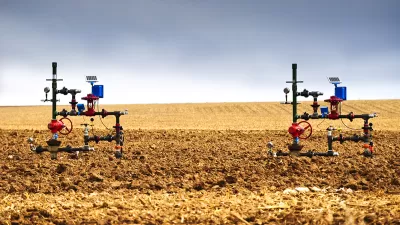A one-year suspension of an Obama-era rule to reduce methane emissions from oil and gas drilling on Federal and Indian lands will increase global warming and reduce federal revenue. Trump took action after Congress failed to repeal the rule.

"After Congress narrowly voted against repealing the BLM rule [last May], Interior [Department] decided to take action itself," adds Dino Grandoni in a Washington Post energy analysis on Dec. 7.
"According to federal estimates, the rule would prevent roughly 180,000 tons a year of methane from escaping into the atmosphere and would boost federal revenue between $3 million and $13 million a year because firms only pay royalties on the oil and gas they capture and contain," reported The Washington Post via Planetizen on May 12 after the U.S. Senate vote.
On Dec. 8, the Federal Register announced that the "Bureau of Land Management (BLM) is promulgating a final rule (2017 final delay rule) to temporarily suspend or delay certain requirements contained in the rule published in the Federal Register on November 18, 2016, entitled, “Waste Prevention, Production Subject to Royalties, and Resource Conservation” (2016 final rule) until January 17, 2019."
The rule's suspension is being litigated by Earthjustice in a lawsuit [pdf] against Interior Secretary Ryan Zinke on behalf of many environmental and natural resource organizations.
Natural gas and oil industry steps in to monitor itself
In the absence of Federal regulations on methane leaks on Federal and Indian lands, the American Petroleum Institute has launched their own voluntary initiative.
"Focused initially on reducing methane and volatile organic compound (VOC) emissions, the Environmental Partnership includes 26 natural gas and oil producers, who produce a significant portion of American energy resources," states their Dec. 5 news release. "Participating companies will begin implementing the voluntary program starting January 1, 2018."
The Environmental Partnership is a historic agreement bringing together American natural gas and oil companies of all sizes to take action, learn and collaborate in an effort to further improve our environmental performance.
But the industry's initiative was about as well-received by The Wilderness Society as the rule's suspension, writes Fears.
“It is inexcusable that the BLM is suspending this rule without putting a new rule in place, because it means that the federal government has decided to leave oversight of methane waste and pollution to the states for the indefinite future,” said Chase Huntley, a program director for energy and climate at the Wilderness Society.
Huntley was also suspicious of the industry’s attempt to regulate itself. “It’s somewhat amazing that the industry hasn’t already put forward its own standard,” he said.
FULL STORY: Trump will suspend a rule to limit a pollutant far worse than carbon dioxide

Study: Maui’s Plan to Convert Vacation Rentals to Long-Term Housing Could Cause Nearly $1 Billion Economic Loss
The plan would reduce visitor accommodation by 25,% resulting in 1,900 jobs lost.

North Texas Transit Leaders Tout Benefits of TOD for Growing Region
At a summit focused on transit-oriented development, policymakers discussed how North Texas’ expanded light rail system can serve as a tool for economic growth.

Why Should We Subsidize Public Transportation?
Many public transit agencies face financial stress due to rising costs, declining fare revenue, and declining subsidies. Transit advocates must provide a strong business case for increasing public transit funding.

How to Make US Trains Faster
Changes to boarding platforms and a switch to electric trains could improve U.S. passenger rail service without the added cost of high-speed rail.

Columbia’s Revitalized ‘Loop’ Is a Hub for Local Entrepreneurs
A focus on small businesses is helping a commercial corridor in Columbia, Missouri thrive.

Invasive Insect Threatens Minnesota’s Ash Forests
The Emerald Ash Borer is a rapidly spreading invasive pest threatening Minnesota’s ash trees, and homeowners are encouraged to plant diverse replacement species, avoid moving ash firewood, and monitor for signs of infestation.
Urban Design for Planners 1: Software Tools
This six-course series explores essential urban design concepts using open source software and equips planners with the tools they need to participate fully in the urban design process.
Planning for Universal Design
Learn the tools for implementing Universal Design in planning regulations.
City of Santa Clarita
Ascent Environmental
Institute for Housing and Urban Development Studies (IHS)
City of Grandview
Harvard GSD Executive Education
Toledo-Lucas County Plan Commissions
Salt Lake City
NYU Wagner Graduate School of Public Service




























